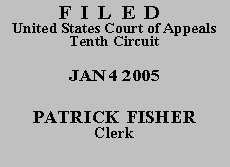

| MARK ARNOLD GOODWIN,
Petitioner-Appellant, v. JOHN E. SUGRUE, Warden; KATHLEEN HAWK, Director of Bureau of Prisons, Respondents-Appellees. |
|
Petitioner Mark Arnold Goodwin, a federal inmate proceeding pro se, appeals the order denying his petition filed under 28 U.S.C. § 2241, seeking a sentence reduction based on his completion of a Residential Drug Abuse Program (the Program), under 18 U.S.C. § 3621(e)(2)(B). A federal magistrate judge recommended that the petition be denied, and the district court adopted the recommendation after a de novo review. The court also denied Mr. Goodwin's post-trial motion to reconsider. We exercise jurisdiction under 28 U.S.C. § 1291 and affirm.
In December of 1996, Mr. Goodwin was sentenced to 120 months' imprisonment plus five years' supervised released on his convictions for possession with intent to distribute methamphetamine and possession of a stolen firearm. In early 1997, he sought the benefit of § 3621(e)(2)(B), which allows a sentence reduction of up to one year upon completion of the Program, but only for those convicted of nonviolent offenses. The Bureau of Prisons (BOP) informed Mr. Goodwin that he was not eligible for early release under § 3621(e)(2)(B) because his firearm conviction placed him outside the class of nonviolent offenders, but he was granted permission to participate in the Program anyway. Mr. Goodwin entered the Program in August of 1997. In August of 1998, the BOP notified him that he was conditionally eligible for early release. In January of 2001, however, the BOP notified him that he was not eligible for early release, pursuant to Lopez v. Davis, 531 U.S. 230, 244 (2001) (holding BOP had discretion and authority to deny early release to category of prisoners whose current offense was a felony involving carrying, possession, or use of firearm). Mr. Goodwin maintains that the BOP's withdrawal of his eligibility for early release violated his rights.
On appeal, Mr. Goodwin asserts that (1) the BOP applied retroactively a judicial decision to deny him early release in violation of the Ex Post Facto Clause, (2) the denial of early release violated his due process rights, (3) the BOP did not apply the correct rules to him, which improperly caused him to be denied early release, and (4) the BOP's attempt to change the regulation governing eligibility for early release under § 3621(c)(2)(B) was invalid because the procedure did not comport with the Administrative Procedure Act.
Because he is a federal prisoner, Mr. Goodwin is not required to obtain a certificate of appealability for review of the order denying his § 2241 petition. Bledsoe v. United States, 384 F.3d 1232, 1235 (10th Cir. 2004). We review de novo the district court's decision to deny a writ under § 2241. Id.
As a preliminary matter, we recognize that Mr. Goodwin did not exhaust administrative remedies. This failure to exhaust does not implicate this court's subject matter jurisdiction. Garrett v. Fleming, 362 F.3d 692, 694 n.2 (10th Cir. 2004). Therefore, we have considered the merits of Mr. Goodwin's appeal.
We have carefully reviewed the record on appeal and the parties' briefs. Applying the standard set out above, we affirm the district court's order denying a writ under § 2241 for the same reasons stated in the magistrate judge's comprehensive and exhaustive recommendation, the district court's order adopting the recommendation, and the district court's order denying reconsideration.
The district court granted Mr. Goodwin's motion to proceed without prepayment of costs and fees on appeal. He is reminded that he is obligated to continue making partial payments until the entire fee has been paid.
The judgment of the district court is AFFIRMED. The mandate shall issue forthwith.
Entered for the Court
Circuit Judge
*. This order and judgment is not binding precedent, except under the doctrines of law of the case, res judicata, and collateral estoppel. The court generally disfavors the citation of orders and judgments; nevertheless, an order and judgment may be cited under the terms and conditions of 10th Cir. R. 36.3.